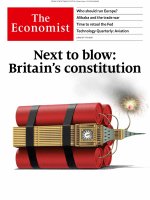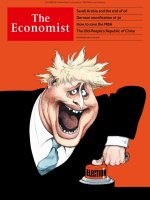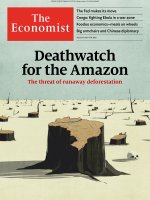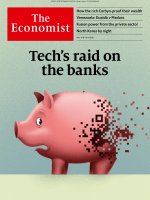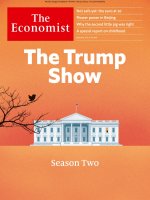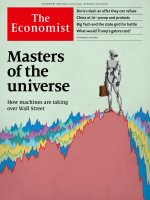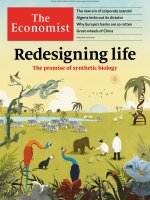The economist UK 14 09 2019
Bạn đang xem bản rút gọn của tài liệu. Xem và tải ngay bản đầy đủ của tài liệu tại đây (29.82 MB, 104 trang )
RELEASED BY "What's News" vk.com/wsnws TELEGRAM: t.me/whatsnws
The EU problem no one talks about
Huawei’s peace offering
What next for Afghanistan?
Flying taxis take off
SEPTEMBER 14TH–20TH 2019
Chips with everything
How the internet of things will change the world
RELEASED BY "What's News" vk.com/wsnws TELEGRAM: t.me/whatsnws
RELEASED BY "What's News" vk.com/wsnws TELEGRAM: t.me/whatsnws
RELEASED BY "What's News" vk.com/wsnws TELEGRAM: t.me/whatsnws
RELEASED BY "What's News" vk.com/wsnws TELEGRAM: t.me/whatsnws
RELEASED BY "What's News" vk.com/wsnws TELEGRAM: t.me/whatsnws
Contents
The Economist September 14th 2019
The world this week
8 A summary of political
and business news
13
14
14
16
Leaders
Connected computers
Chips with everything
The war in Afghanistan
Talking chop
The tech cold war
A way forward?
E-cigarettes
Don’t panic
Europe’s economy
A singular opportunity
On the cover
18
How the world will change as
computers spread into
everyday objects: leader,
page 13. Drastic falls in cost are
powering another computer
revolution, see our Technology
Quarterly, after page 46
Letters
20 On sea levels, democracy,
property, Taiwan, India,
Europe, Jacob Rees-Mogg
• The EU problem no one talks
about Europe’s best hope of
economic revival lies in
reanimating its neglected single
market: leader, page 18. It is not
just incomplete, in many areas it
is going backwards: briefing,
page 23
• Huawei’s peace offering
Don’t dismiss it entirely: leader,
page 14. Ren Zhengfei appears
prepared to sell all Huawei’s 5G
technology to a Western buyer,
page 63
Briefing
23 The single market
An unconscious
uncoupling
Technology Quarterly:
Chips with everything
Ubiquitous computing
After page 46
32
33
34
35
36
36
38
Europe
Macron and pensions
Europe’s new commission
Moscow’s slap to Putin
Protest rap in Turkey
State-run tithing
Charlemagne The EU and
trade
39
40
41
41
42
44
44
46
United States
After John Bolton
North Carolina’s election
Gig workers
Organised labour
Deaths linked to vaping
Facebook’s dating service
Indiana’s Modernism
Lexington Political
journalism
The Americas
47 Venezuela’s exodus
48 Eating Chinese in Havana
49 Bello Venezuela’s morass
• What next for Afghanistan?
America calls off negotiations to
end its 18-year war with the
Taliban, page 54. It will have to
resume them eventually: leader,
page 14
• Flying taxis take off Small
hovering craft are being readied
to fly people around cities,
page 78
27
28
29
29
30
31
31
Britain
How Europe sees Brexit
The Speaker muted
British Airways v pilots
Foreign students’ visas
Political pacts
Ministerial churn
Interest rates after
no-deal
Bagehot Two tribes go to
lunch
Bartleby A new book
reveals the excessive
attention paid to how
executives look, page 64
50
51
52
52
53
Middle East & Africa
Bibi’s West Bank gamble
Tunisia’s odd election
Mozambique’s nuts
Xenophobia in South
Africa
Zimbabwe after Mugabe
1 Contents continues overleaf
5
RELEASED BY "What's News" vk.com/wsnws TELEGRAM: t.me/whatsnws
6
Contents
54
55
55
56
56
57
The Economist September 14th 2019
Asia
America and Afghanistan
Drug shame in Japan
Cows’ urine in India
East Timor’s history
Urbanisation in
Bangladesh
Banyan Japanese spies
71
72
73
74
74
75
76
China
58 Fears of Hong Kong
contagion
60 Chaguan Trucker culture
78
79
80
81
81
International
61 The great drug shortage
82
63
64
66
66
67
68
70
83
84
85
Business
Huawei’s piece offering
Bartleby Executive looks
Apple’s cart
From Russia with
diamonds
VW’s profit motor
Nissan loses another boss
Schumpeter The
Microsoft doctrine
Finance & economics
Fannie and Freddie
A Hong Kong bid for LSE
Buttonwood The Japan
bid
Poorly pigs in China
The IMF’s next boss
Macri’s mistakes
Free exchange Revisiting
the commons
Science & technology
Flying taxis take off
The sound of sand
Fountain of youth
Neanderthal earaches
An exoplanet with water
Books & arts
A sequel to “The
Handmaid’s Tale”
Corporate America
A history of Brooklyn
Hong Kong cinema
Economic & financial indicators
88 Statistics on 42 economies
Graphic detail
89 Austria’s century bonds
Obituary
90 Robert Mugabe, hero turned tyrant
Subscription service
Volume 432 Number 9160
Published since September 1843
to take part in “a severe contest between
intelligence, which presses forward,
and an unworthy, timid ignorance
obstructing our progress.”
Editorial offices in London and also:
Amsterdam, Beijing, Berlin, Brussels, Cairo,
Chicago, Johannesburg, Madrid, Mexico City,
Moscow, Mumbai, New Delhi, New York, Paris,
San Francisco, São Paulo, Seoul, Shanghai,
Singapore, Tokyo, Washington DC
For our full range of subscription offers, including
digital only or print and digital combined, visit:
Economist.com/offers
You can also subscribe by post, telephone or email:
One-year print-only subscription (51 issues):
Post:
UK..........................................................................................£179
The Economist Subscription
Services, PO Box 471, Haywards
Heath, RH16 3GY, UK
Please
Telephone: 0333 230 9200 or
0207 576 8448
Email:
customerservices
@subscriptions.economist.com
PEFC/16-33-582
PEFC certified
This copy of The Economist
is printed on paper sourced
from sustainably managed
forests certified by PEFC
www.pefc.org
Registered as a newspaper. © 2019 The Economist Newspaper Limited. All rights reserved. Neither this publication nor any part of it may be reproduced, stored in a retrieval system, or transmitted in any form or by any means, electronic,
mechanical, photocopying, recording or otherwise, without the prior permission of The Economist Newspaper Limited. Published every week, except for a year-end double issue, by The Economist Newspaper Limited. The Economist is a
registered trademark of The Economist Newspaper Limited. Printed by Walstead Peterborough Limited.
RELEASED BY "What's News" vk.com/wsnws TELEGRAM: t.me/whatsnws
RELEASED BY "What's News" vk.com/wsnws TELEGRAM: t.me/whatsnws
8
The world this week Politics
partial withdrawal of American
troops from Afghanistan—
without even securing a ceasefire from the Taliban.
Donald Trump sought his
fourth national security adviser in less than three years after
firing John Bolton, who had
been in the job for 17 months.
Mr Bolton says he resigned
before Mr Trump sacked him.
The pair had not seen eye to
eye: Mr Bolton was far more
hawkish on Iran, North Korea
and Russia.
At least one of Mr Bolton’s
views appears to have prevailed. Mr Trump abruptly
cancelled a peace summit with
the Taliban. Hawks had fretted
that Mr Trump’s proposed deal
made a big concession—the
The cia removed one of its
most highly placed intelligence sources from the Kremlin in 2017, according to press
reports, in part because of
concerns that the new Trump
administration was careless in
handling sensitive material.
The decision to extract the spy
came shortly after Mr Trump
discussed classified
information with the Russian
foreign minister during a
meeting at the White House.
Still on the streets
Thousands of protesters
marched to the American
consulate in Hong Kong to
show support for a bill being
considered by Congress that
could result in sanctions
against officials who suppress
freedoms in the Chinese territory. On the fringes, some
The Economist September 14th 2019
demonstrators set fires and
engaged in other vandalism.
The government in Beijing
closed the city’s central
thoroughfare to allow the army
to practise a parade that will be
staged on October 1st, the 70th
anniversary of Communist
rule. The state news agency
said about 90,000 people were
involved in the rehearsal.
Indian scientists lost contact
with the country’s first lunar
lander during its final descent
to the Moon. The craft’s
mothership, in orbit around
the Moon, later located it near
its intended landing site, but
attempts to resume contact
with the probe have failed.
Shinzo Abe, Japan’s prime
minister, reshuffled his
cabinet. Shinjiro Koizumi, the
son of a former prime minister
and a rising star within the
ruling Liberal Democratic
Party, was appointed
environment minister.
North Korea offered to resume
disarmament talks with
America. But it also tested two
short-range missiles, the
eighth such exercise since July.
The race begins
Canada’s prime minister,
Justin Trudeau, formally began
the campaign leading up to a
general election on October
21st. Both his Liberal Party and
the opposition Conservatives,
led by Andrew Scheer, have the
support of about 30% of voters.
Among the main issues will be
climate change and allegations
that Mr Trudeau’s office
improperly tried to end the
prosecution of snc-Lavalin, a
big engineering firm, for
paying bribes.
Marcelo Crivella, the mayor of
Rio de Janeiro, who is a former
evangelical bishop, ordered the
confiscation from a book fair
of a comic book that depicts
two men kissing. He said
1
“Avengers: The Children’s
RELEASED BY "What's News" vk.com/wsnws TELEGRAM: t.me/whatsnws
The Economist September 14th 2019
2 Crusade” was unsuitable for
children. The president of
Brazil’s supreme court ruled
the book-grabbing unlawful.
Migrants not welcome
Violent protests in South
Africa against immigrants
from other African countries
entered their second week.
About 12 people have been
killed in the riots. Other African nations have responded
with outrage. A Nigerian airline began evacuating terrified
Nigerians who want to leave
South Africa.
Robert Mugabe, who ruled
Zimbabwe for almost four
decades after its independence
until he was overthrown in a
coup in 2017, died aged 95.
Much-praised by leftists when
he took over, he swiftly started
locking up and murdering his
opponents. His policies caused
economic collapse, hyperinflation and a mass exodus of
hungry Zimbabweans.
Almost 300,000 people have
fled their homes in Burkina
Faso because of attacks by
jihadist groups. The country,
which was moving towards
democracy, has been destabilised by jihadist insurgencies in
neighbouring Mali and Niger.
Israel’s prime minister, Binyamin Netanyahu, promised to
annex the Jordan Valley and
northern Dead Sea (about a
third of the occupied West
Bank) if he wins a general
election on September 17th.
Sceptics called it a political
stunt to woo hawkish voters.
An Iranian tanker seized by
British marines in July delivered its cargo of oil to Syria.
The ship was released after Iran
promised that it was not bound
for Syria. Britain said the move
represented an “unacceptable
violation of international
norms” and summoned Iran’s
ambassador in London. It was
also revealed that Iran had
detained three westerners.
The world this week 9
The autumn of our discontent
In Britain opposition mps
demanded to return to work
after Scotland’s highest court
ruled that Parliament’s prorogation by the British government was unlawful. The uk
Supreme Court will decide the
matter. Before Parliament’s
suspension mps again voted
down the Brexit plans of Boris
Johnson, the prime minister,
handing him six defeats. John
Bercow said he would resign as
Speaker. Though a hero to
Remainers, he has been
criticised by Leavers for helping mps thwart the government’s Brexit plans.
Ursula von der Leyen, the next
president of the European
Commission, unveiled her
proposed team of commissioners. Three new “executive
vice-presidents” will help her.
Margrethe Vestager is the most
interesting of these, with the
key job of making Europe “fit
for the digital age” on top of her
powerful existing role overseeing competition policy.
Russia and Ukraine swapped
prisoners who had been held
over the conflict in east
Ukraine. Dozens were freed in
what is seen as a modest step
towards easing tensions.
Vladimir Putin’s ruling United
Russia party suffered a stinging rebuke at the hands of
voters in Moscow, losing 15 of
the 40 seats on the city council
it had controlled. This was
despite the fact that many
opposition candidates had
been barred from contending. 1
RELEASED BY "What's News" vk.com/wsnws TELEGRAM: t.me/whatsnws
10
The world this week Business
Ren Zhengfei, the founder and
boss of Huawei, said he was
considering selling his company’s 5g technology, which
has become a source of tension
between America and China.
The Chinese maker of telecoms
equipment has in effect been
locked out of the American
roll-out of 5g because of
national-security concerns. Mr
Zhengfei suggested Huawei
would share 5g patents with a
buyer, along with licences and
codes, but it would continue to
sell its own 5g equipment.
The operator of the Hong Kong
stock exchange submitted a
surprise $36.6bn unsolicited
bid for the London Stock
Exchange. The lse said it
remained committed to its
recent agreement to buy
Refinitiv, a financial-data
provider, for $27bn.
The gig is up
California’s legislature passed
a bill that will compel firms in
the gig economy to reclassify
their workers as employees
rather than contractors. The
law comes into force on January 1st and will affect many
startups and firms that rely on
low labour costs. Uber and Lyft
lobbied hard against the legislation, arguing that it could
wreck their businesses. Portending a possible legal challenge, Uber suggested the law
would not apply to its drivers.
South Korea lodged a complaint at the World Trade Organisation over Japan’s limits on
exports of materials crucial to
South Korea’s consumerelectronics industry. Japan
claims the restrictions are
based on national-security
concerns, though its actions
are widely seen as a response
to the decisions of South
Korean courts ordering Japanese firms to pay compensation for forced labour during
the second world war.
Hiroto Saikawa resigned as
Nissan’s chief executive, as the
company revealed that he had
received an “improper” increase in share-based compensation in 2013 (it did not accuse
him of misconduct). Investors
had also lost confidence in Mr
Saikawa as profits plunged and
relations soured with Renault,
Nissan’s partner, following the
ousting of Carlos Ghosn.
Steven Mnuchin, America’s
treasury secretary, went to
Capitol Hill to explain his
proposals for reforming
Fannie Mae and Freddie Mac,
government-sponsored
enterprises that back most of
the mortgage industry. Fannie
and Freddie were bailed out
during the financial crisis. Mr
Mnuchin wants to begin recapitalisation soon, and has urged
Congress to agree to more
far-reaching reforms.
British Airways struggled to
recover from a two-day strike
by pilots over pay, which
caused the airline to cancel the
vast majority of its flights.
Unless the dispute over pay is
resolved another strike is
scheduled to take place at the
end of the month.
America’s Centres for Disease
Control advised the public not
to use e-cigarettes, after the
deaths of six people were
linked to vaping. Meanwhile,
the Food and Drug Administration requested more information from Juul, the biggest
e-cigarette maker, about its
The Economist September 14th 2019
marketing practices, especially
to young people.
The Epstein connection
mit appointed a committee to
oversee its Media Lab after
Joichi Ito resigned as director
following press reports that the
lab had accepted donations
from Jeffrey Epstein, the late
disgraced financier, and tried
to conceal them. The Media
Lab is at the forefront of bringing together disparate research
in technology, notably
artificial intelligence.
In an abrupt move Saudi
Arabia replaced Khalid al-Falih
as energy minister with Prince
Abdulaziz bin Salman, an
oil-industry insider. Mr Falih
was also recently removed as
chairman of Saudi Aramco, the
kingdom’s state oil company.
The promotion of Prince
Abdulaziz is a sign that the
government wants to accelerate Aramco’s delayed ipo.
Tributes were paid to T. Boone
Pickens, who died aged 91. An
oilman who undertook a number of audacious takeover bids,
Mr Pickens came to define
American tooth-and-claw
capitalism in the 1980s. He
once said, “I never liked being
called a raider. I never
destroyed anything.”
Apple’s annual product launch
underscored the shift in its
strategy towards services, as
sales of the iPhone stall. Rather
than using the event to jack up
prices, Apple is selling the
basic version of the iPhone 11 at
a comparatively modest $699,
which helps it retain customers. It also priced its new tv
streaming service at $4.99 a
month, undercutting Netflix.
The low price may reflect the
limited content Apple will
screen on the service when it
starts in November.
Jack Ma stepped down as
chairman of Alibaba, the Chinese tech giant that he founded
20 years ago. Daniel Zhang is
combining the role with that of
chief executive. Mr Ma
announced his retirement a
year ago in order to focus on
philanthropy, but he will
remain on hand to offer advice
to his successor, who faces an
uncertain trade climate.
RELEASED BY "What's News" vk.com/wsnws TELEGRAM: t.me/whatsnws
RELEASED BY "What's News" vk.com/wsnws TELEGRAM: t.me/whatsnws
RELEASED BY "What's News" vk.com/wsnws TELEGRAM: t.me/whatsnws
Leaders
Leaders 13
Chips with everything
How the world will change as computers spread into everyday objects
O
n august 29th, as Hurricane Dorian tracked towards America’s east coast, Elon Musk, the boss of Tesla, an electric-car
maker, announced that some of his customers in the storm’s
path would find that their cars had suddenly developed the ability to drive farther on a single battery charge. Like many modern
vehicles, Mr Musk’s products are best thought of as internet-connected computers on wheels. The cheaper models in Tesla’s
line-up have parts of their batteries disabled by the car’s software
in order to limit their range. At the tap of a keyboard in Palo Alto,
the firm was able to remove those restrictions and give drivers
temporary access to the full power of their batteries.
Mr Musk’s computerised cars are just one example of a much
broader trend. As computers and connectivity become cheaper,
it makes sense to bake them into more and more things that are
not, in themselves, computers—from nappies and coffee machines to cows and factory robots—creating an “internet of
things”, or iot (see Technology Quarterly). It is a slow revolution
that has been gathering pace for years, as computers have found
their way into cars, telephones and televisions. But the transformation is about to go into overdrive. One forecast is that by 2035
the world will have a trillion connected computers, built into
everything from food packaging to bridges and clothes.
Such a world will bring many benefits. Consumers will get
convenience, and products that can do things
non-computerised versions cannot. Amazon’s
Ring smart doorbells, for instance, come
equipped with motion sensors and video cameras. Working together, they can also form what
is, in effect, a private cctv network, allowing the
firm to offer its customers a “digital neighbourhood-watch” scheme and pass any interesting
video along to the police.
Businesses will get efficiency, as information about the physical world that used to be ephemeral and uncertain becomes
concrete and analysable. Smart lighting in buildings saves energy. Computerised machinery can predict its own breakdowns
and schedule preventive maintenance. Connected cows can
have their eating habits and vital signs tracked in real time,
which means they produce more milk and require less medicine
when they fall ill. Such gains are individually small but, compounded again and again across an economy, they are the raw
material of growth—potentially a great deal of it.
In the long term, though, the most conspicuous effects of the
iot will be in how the world works. One way to think of it is as the
second phase of the internet. This will carry with it the business
models that have come to dominate the first phase—all-conquering “platform” monopolies, for instance, or the data-driven
approach that critics call “surveillance capitalism”. Ever more
companies will become tech companies; the internet will become all-pervasive. As a result, a series of unresolved arguments
about ownership, data, surveillance, competition and security
will spill over from the virtual world into the real one.
Start with ownership. As Mr Musk showed, the internet gives
firms the ability to stay connected to their products even after
they have been sold, transforming them into something closer to
services than goods. That has already blurred traditional ideas of
ownership. When Microsoft closed its ebook store in July, for instance, its customers lost the ability to read titles they had
bought (the firm offered refunds). Some early adopters of “smart
home” gadgets have found that they ceased to work after the
firms that made them lost interest.
That tilts the balance of power from the customer to the seller.
John Deere, an American maker of high-tech tractors, has been
embroiled in a row over software restrictions that prevent its
customers from repairing their tractors themselves. And since
software is not sold but licensed, the firm has even argued that,
in some circumstances, a tractor-buyer may not be buying a product at all, instead receiving only a licence to operate it.
Virtual business models will jar in the physical world. Tech
firms are generally happy to move fast and break things. But you
cannot release the beta version of a fridge. Apple, a smartphonemaker, provides updates for its phones for only five years or so
after their release; users of Android smartphones are lucky to get
two. But goods such as washing machines or industrial machinery can have lifespans of a decade or more. Firms will need to
work out how to support complicated computerised devices
long after their original programmers have moved on.
Data will be another flashpoint. For much of the internet the
business model is to offer “free” services that are
paid for with valuable and intimate user data,
collected with consent that is half-informed at
best. That is true of the iot as well. Smart mattresses track sleep. Medical implants observe
and modify heartbeats and insulin levels, with
varying degrees of transparency. The insurance
industry is experimenting with using data from
cars or fitness trackers to adjust customers’ premiums. In the virtual world, arguments about what should be
tracked, and who owns the resulting data, can seem airy and theoretical. In the real one, they will feel more urgent.
Then there is competition. Flows of data from iot gadgets are
just as valuable as those gleaned from Facebook posts or a Google
search history. The logic of data-driven businesses, which do
ever better as they collect and process more information, will
replicate the market dynamics that have seen the rise of giant
platform companies on the internet. The need for standards, and
for iot devices to talk to each other, will add to the leaders’ advantages—as will consumer fears, some of them justified, over
the vulnerability of internet-connected cars, medical implants
and other devices to hacking.
Predicting the consequences of any technology is hard—
especially one as universal as computing. The advent of the consumer internet, 25 years ago, was met with starry-eyed optimism. These days it is the internet’s defects, from monopoly
power to corporate snooping and online radicalisation, that
dominate the headlines. The trick with the iot, as with anything,
will be to maximise the benefits while minimising the harms.
That will not be easy. But the people thinking about how to do it
have the advantage of having lived through the first internet revolution—which should give them some idea of what to expect. 7
RELEASED BY "What's News" vk.com/wsnws TELEGRAM: t.me/whatsnws
14
Leaders
The Economist September 14th 2019
The war in Afghanistan
Talking chop
The United States will have to resume negotiations with the Taliban eventually
F
or months America and the Taliban had been haggling over
an agreement to end their 18-year war in Afghanistan. A deal
was in sight. But then President Donald Trump learned that a Taliban bomber in Kabul had killed an American soldier, as well as
11 other people (see Asia section). “I immediately…called off
peace negotiations,” he fumed on Twitter.
The decision came as a relief to many, who had feared that Mr
Trump was ready to sign any deal with the Taliban, no matter
how humiliating for America or catastrophic for Afghanistan,
just to keep a campaign promise to stop America’s “endless wars”
and bring the troops home. As he called off the talks, the president revealed that he had been on the verge of hosting Taliban
negotiators at Camp David, his rural retreat, in the hope of sealing a deal there. Many Americans would have
been shocked by the spectacle of their president
welcoming the group that once sheltered Osama
bin Laden, just days before the anniversary of
the attacks of September 11th 2001. Instead, after
Mr Trump put his foot down, the American commander in Afghanistan said he was increasing
the tempo of attacks on the Taliban. Negotiations were “dead”, Mr Trump reiterated.
The deal America was on the verge of striking looked lopsided. It was one of the sources of disagreement between Mr
Trump and John Bolton, his national security adviser, who left
his job this week, removing the administration’s chief hawk (see
United States section). It involved America withdrawing 5,000
troops without the Taliban even agreeing to a ceasefire. That is
not quite as abject as it sounds. America would still have had
enough manpower to carry on training the Afghan army and giving it air support. In the meantime, the Taliban in effect agreed to
negotiate directly with the Afghan government, although this
was dressed up as part of a national dialogue. That is something
the Taliban had until now tenaciously resisted.
The problem is that the Taliban have no incentive to make big
concessions, such as accepting a ceasefire or moderating their
demand for a theocracy, if they believe that time is on their side.
Some suspect that Mr Trump just wants to declare victory before
the next election and leave Afghanistan to its fate come what
may. To forge a durable peace, Mr Trump must convince them
they are wrong and that he will stay if needs be. It will not be easy.
The war cannot be won by arms alone. Even when America
had 100,000 troops in Afghanistan, seven times more than today, it could not stamp out the Taliban. With relatively few
troops, America suffers just a dozen or so deaths a year, and still
stops the Taliban from overrunning the country. Yet thousands
of Afghans perish, and life is made miserable for the remainder.
An abrupt American pull-out would make matters worse,
dooming Afghanistan to an even bloodier civil
war and possibly to an eventual Taliban victory.
That would destabilise the region, create another potential haven for terrorists and leave Afghans at the mercy of a group that murders girls
for going to school. It is hard to imagine a worse
outcome from 18 years of war.
If military victory is unattainable and surrender unpalatable, that leaves only one option:
more negotiation. The Taliban say they are still open to dialogue.
Fine, let them talk with the elected government of Afghanistan.
America should use all its muscle to bring both sides to the table.
And it should make clear that it will support the regime in Kabul
until it is no longer in danger of being overthrown by jihadists.
Everyone will have to make galling compromises. The Taliban
will once again have to be allowed a prominent role in government, because that is the way to give them a stake in the peace.
Such a deal is a long way off. It will not be settled in time for
anyone to brag about it on the campaign trail in 2020. So be it. Mr
Trump was right not to rush into a bad deal. Afghanistan’s future
and America’s credibility will depend on him, or a future president, having the patience and resolve to strike a better one. 7
The tech cold war
A way forward?
Huawei has made a peace offering. Don’t dismiss it entirely
A
merica has unleashed a barrage of actions against Huawei,
a Chinese telecoms giant which it believes spies for the Chinese government and threatens Western interests because of its
dominant role in 5g technologies. Since May, American firms
have mostly been banned from supplying Huawei. The Justice
Department wants Canada to extradite a top executive who is accused of sanctions-busting. Uncle Sam’s diplomats have urged
other countries to stop using Huawei gear. America’s aim has
been to cripple a business that it views as a menace.
As we report this week from Shenzhen, where Huawei is
based, the plan has not worked (see Business section). True, Hua-
wei is suffering. Western banks are wary of it. Silicon Valley suppliers and the owners of datasets have shied away. And on September 19th Huawei, which as well as building networks is the
world’s second-biggest smartphone-maker, faces the humiliation of launching a new handset that lacks popular American
apps such as Google Maps and WhatsApp.
Yet the Chinese firm is hardly on its knees. Not many 5g contracts have been cancelled. It is doing well at home and in countries that are not close American allies. The growth in its revenues is stabilising, following a drop after May, and it expects to
stay profitable. It has $36bn of spare cash. The firm says it has al- 1
RELEASED BY "What's News" vk.com/wsnws TELEGRAM: t.me/whatsnws
RELEASED BY "What's News" vk.com/wsnws TELEGRAM: t.me/whatsnws
16
Leaders
The Economist September 14th 2019
2 ternative sources for most components and it may soon launch a
rival to Android, Google’s smartphone operating-system.
Instead of Huawei’s demise, the tech world faces a split, with
an increasingly self-sufficient Chinese industry active everywhere but America. America and its allies could lag behind in 5g,
because Chinese firms offer cutting-edge technology at the lowest cost. Replacing existing Huawei gear would be expensive.
Competition would suffer. And if Huawei develops rivals to the
likes of Android it would weaken Western tech firms.
It is right to be wary of Huawei. No Chinese firm can simply
defy the country’s autocratic rulers, especially in matters of national security. The question is whether there is a mechanism to
mitigate the risks and create trust where little exists. Britain and
Germany have set up monitoring bodies to scrutinise Huawei
products, but that has not impressed American officials.
Now Ren Zhengfei, Huawei’s boss, has floated an alternative:
cloning his 5g technology “stack” (patents, code, blueprints and
production know-how) and selling it to a Western firm, which
would be free to use it outside China and develop the technology
as it sees fit. Buyers might include Samsung or Ericsson.
Telecoms intellectual-property portfolios have been sold before. Microsoft bought parts of Nokia in 2014, for example. In this
case the buyer would face no competition from Huawei in America, where the Chinese firm does not operate (although it would
need to deal with different spectrum frequencies there). In other
countries the two would go head to head, though it would take
the new competitor years to ramp up manufacturing.
The sale of Huawei’s technology would not guarantee security from Chinese spies or saboteurs. Its spooks would remain perfectly capable of hacking networks run by Western companies.
But the West would gain safe access to cutting-edge 5g technologies, avoiding roll-out delays. Competition would be enhanced
by a new Western contender or a stronger existing one. The
world might regrettably still have two tech ecosystems, but the
plan might nonetheless help defuse the tech cold war.
The two superpowers are on a dangerous path. If it chooses
escalation, America has one option: to try to put Huawei out of
business outside China, which could spark a gloves-off conflict.
In normal circumstances Mr Ren’s suggestion would be outlandish. In times like these it deserves a hearing. 7
E-cigarettes
Don’t panic
Adulterated vaping fluid appears to be killing people. That is no reason to ban all e-cigarettes
“I
t’s time to stop vaping,” says Lee Norman, a health official in
Kansas. Six people are dead in America, apparently from
smoking e-cigarettes. More than 450 have contracted a serious
lung disease. So Mr Norman’s advice sounds reasonable. The
Centres for Disease Control and the American Medical Association agree: the country’s 11m vapers should quit. A new idea is circulating, that vaping is worse than smoking. On September 11th
the Trump administration said it intends to ban non-tobacco flavoured vaping fluid (see United States section). Some politicians
want a broader ban on all e-cigarettes.
The facts have gone up in smoke, as so often happens during
health scares. Although more research is needed, the evidence so
far suggests that the recent vaping deaths in
America did not come from products bought in
a shop but from badly made items sold on the
street. In five out of six cases, the tainted vaping
products were bought illicitly; the other involved liquid bought in a legal cannabis shop in
Oregon. One theory is that the vape fluid was
mixed with vitamin E. This is an oil—something
that should not enter the lungs. If inhaled, oil
causes the type of symptoms that the stricken vapers display.
America’s Food and Drug Administration (fda), which is investigating the products involved, rightly refuses to panic. It
says vapers should not buy products containing cannabis extract, or those sold on the street. This is sensible. When you buy
an unlicensed liquid from an unregulated supplier, you have no
idea what you are puffing. This is why governments also discourage people from drinking moonshine spirits, which are sometimes deadly. In Costa Rica, for example, 25 people recently died
from imbibing hooch contaminated with methanol. However,
just as with alcohol, regulators should draw a distinction between illicit products and the legal, unadulterated sort.
E-cigarettes are not good for you. The vapour that vapers inhale is laced with nicotine, which is addictive. Some of the other
chemicals in it may be harmful. But vaping is far less dangerous
than smoking tobacco—a uniquely deadly product. If people
turn to e-cigarettes as a substitute for the conventional sort, the
health benefits are potentially huge. Smoking kills 450,000
Americans every year, and a staggering 7m people worldwide.
Anything that weans people off tobacco is likely to save lives.
The big worry about e-cigarettes is that they will create a new
generation of nicotine addicts. Some people who have never previously smoked have taken up vaping, including a worrying
number of children. In America, for example, one quarter of
high-school pupils vape.
This is alarming, and helps explain why so
many governments, such as those of Egypt,
Mexico, Singapore, Taiwan and Brazil, have
banned e-cigarettes. They should not. Prohibition usually causes more harm than good. Forbidding e-cigarettes will lead vapers to buy illicit products—the type that are far more likely to
poison them. It will also deter many law-abiding smokers from switching to something less deadly.
For these reasons, regulating vaping is wiser than trying to
eliminate it. Governments should carefully control what goes
into vape fluid, following the example of the European Union,
which restricts the amount of nicotine it may contain. America’s
fda, by contrast, seems constantly to change its mind about how
to regulate vaping. Governments should also regulate how e-cigarettes are advertised. Marketing aimed at children is obviously
unacceptable. So, perhaps, are fruity flavours that appeal especially to young palates. Government health warnings should be
clear and measured. Vaping may be a dangerous habit, but it is
vastly less deadly than lighting up. 7
RELEASED BY "What's News" vk.com/wsnws TELEGRAM: t.me/whatsnws
RELEASED BY "What's News" vk.com/wsnws TELEGRAM: t.me/whatsnws
18
Leaders
The Economist September 14th 2019
Europe’s economy
A singular opportunity
Europe’s best hope of economic revival lies in reanimating its single market
E
very five years the appointment of a new team at the European Commission is a chance to steer the European Union
(eu) in a fresh direction. On September 10th Ursula von der
Leyen, the incoming boss, set out her priorities: managing the
transition from fossil fuels, extra dollops of American big-tech
bashing and “upgrading our unique social market economy”.
The first two at least have the benefit of being clear. On the
economy, however, Europe needs a lot more than blather. In the
past decade the trend of economic integration that defined postwar Europe has gone backwards. The “single market”, once
breathtaking in its ambition to eliminate all internal eu barriers
for goods, services, capital and people, has failed to keep up with
the economies it was trying to shape. If Europe wants to create
prosperity and world-beating firms, it needs not just to reinvigorate the single market, but also to rediscover that original vision
in neglected areas of trade such as services.
The single market still matters—look at the mess Britain finds
itself in as it tries to extricate itself from the eu. But a policy originally devised to break down trade barriers in the era of coal and
steel has not adapted fast enough to the era of bits and likes (see
Briefing). In the past decade Europe’s banks have retrenched to
their home markets and its firms have shifted their energies to
expanding outside the eu. As a result, Europe still looks like a series of mid-sized economies patched together,
not a single rival to China and America.
That is one reason why, even as central bankers administer a drip-feed of monetary adrenalin, Europe’s economy is losing ground to global
rivals. It risks becoming a business backwater. A
decade ago ten of the world’s 40 largest listed
firms by market value were based in the eu; now
only two are—in 32nd and 36th place. Desperately few of the world’s leading startups are European.
Policymakers who ache at the absence of a European tech success on the scale of Google or Amazon pay lip service to the importance of the single market. And yet France and Germany argue that the real answer is dirigiste industrial policy. They have
called for mergers of European firms to create industrial “champions” shielded from antitrust rules and Chinese competition.
They should be aiming to complete the single market instead.
A functional single market helps firms achieve economies of
scale. It is cheaper to make a product that has to meet one set of
eu regulations than to try to follow 28 different national rulebooks. Stiffer competition from firms across the continent
means that shoppers get better and cheaper stuff. Imagine if the
dozens of mobile operators in Europe were free to pitch their
data plans to those beyond their national borders. Instead, consumers have to make do with higher-charging local oligopolies.
Innovation spreads faster in a unified market, pepping up
productivity. A properly integrated energy grid would boost the
most efficient (and greenest) power producers. Banks with loans
out across the continent avoid trouble if their home market falls
into recession. Capital markets on a continental scale can help
them distribute risks beyond the banking sector. Safer banks and
deeper markets mean cheaper capital and fewer bail-outs.
For all those reasons, reinvigorating the single market ought
to be at the centre of the debate on how to boost Europe’s economy. It is not. Since her appointment two months ago Mrs von
der Leyen has mentioned the single market only in passing (see
Europe section). The commissioner in charge of the brief, Sylvie
Goulard of France, is well regarded, but will have to split her time
between internal-market duties, regulating artificial intelligence, and a new defence-industry and space brief.
That might be understandable if the single market were beyond saving. In fact it can be revitalised in three ways. The first is
to ensure that its statutes are fully implemented. Too often, national governments flout the edicts of the single market so as to
protect a politically connected industry. On average, each European country regulates the workings of nearly 200 professions,
making it needlessly tricky for Europeans to move to where the
jobs are. No wonder bits of the continent still have double-digit
unemployment. The new Brussels team should step up enforcement against governments that fail to apply the rules.
The second way is to focus on the euro. The single currency is
in some ways an extension of the single market, even if fewer
countries belong to it. It would be more stable if a central fund
insured bank deposits. A more substantial euro-zone budget, focused on unemployment insurance, say, could help integrate
euro-zone economies. As an added benefit, this
would also deepen cross-border links, notably
by helping banks become truly European. Here,
Mrs von der Leyen has a harder task. Her native
Germany will seek to keep progress glacial.
Most ambitious would be a fresh push to remove what structural barriers remain to crossborder European trade. Collecting value-added
tax in a neighbouring country would not be so
daunting for small businesses if the levy was structured in the
same way across Europe, for example. Banks would pitch their
wares more broadly if bankruptcy laws were harmonised, and a
proper capital-markets union created. Standard contracts for
business services (on professional liability, say) would make it
easier for German accountants to tout for business in Italy, or for
Spanish architects to pitch their offerings beyond the Pyrenees.
A grand bargain of policies serving up tax reform, services liberalisation and a more robust euro would run into plenty of national red lines. But each country would also have lots to gain.
Europe needs to shield itself from the fallout a global trade war
might bring. It needs a vision after the departure of Britain, the
single market’s most reliable champion in Brussels—but also,
often, a brake on ambitious projects. Meanwhile, Britons tempted to say good riddance to the single market’s frustrations should
reflect on how much losing a seat at the table could cost them.
Jacques Delors, a former head of the European Commission
who championed closer integration, rightly pointed out that
“nobody can fall in love with the single market”. There is nothing
flashy about reworking bankruptcy rules or tax regimes. But Europe’s greatest economic project is half-finished business, yielding just half the benefits it could. Europe has few such obvious
levers to pull to boost its economy. Time to tug on this one. 7
RELEASED BY "What's News" vk.com/wsnws TELEGRAM: t.me/whatsnws
RELEASED BY "What's News" vk.com/wsnws TELEGRAM: t.me/whatsnws
20
Letters
Rising sea levels
“Higher tide” (August 17th)
shone a light on the serious
threat that climate change
poses to the world’s coastal
communities. Existing efforts
to reduce carbon emissions
and limit average temperature
increases are insufficient.
Climate mitigation must also
be met with climate
adaptation.
Fostering resilience to the
effects of climate change not
only meets a compelling
humanitarian obligation, but
also makes economic sense.
For example, mangrove forests
are one of the most effective
tools to shield the world’s
poorest coastal communities
from rising sea levels. Each
year these forests protect 18m
people from coastal flooding
and prevent more than $80bn
in damages. The benefits of
mangrove preservation and
restoration are up to ten times
the costs.
But rising sea levels are just
one symptom of climate
change. Its effects touch upon
every aspect of our lives. In
advance of the un Climate
Action Summit in New York,
the Global Commission on
Adaptation has just published
its landmark report offering
practical solutions to guide
countries on how to adapt to
the effects of climate change.
This is a live issue and the
quicker we act to adapt the
greater the dividends.
prof. patrick verkooijen
Chief executive
Global Centre on Adaptation
Rotterdam
Things fall apart (eventually)
The most compelling explanation for the rise of today’s
populism (“Democracy’s enemy within”, August 31st) can be
found in the sociological study
of structural-demographic
theory. In the “Ages of Discord”,
Peter Turchin described how
America is going through a
“disintegrative phase”, last
seen in the 1860s. In this phase,
political fragmentation grows,
social democracy declines,
elites take greater economic
and political power (and seek
The Economist September 14th 2019
more positions than the country offers), workers suffer from
stagnant wages and inequality,
authoritarianism grows, and
the state is headed toward
fiscal crisis. Mr Turchin’s book
fully explains the dynamic
factors at work and is supported by much empirical data.
You actually described the
disintegrative phase without
recognising it for what it is.
This phase may not be the end
of some democracies (or
democracy in general), but as
Mr Turchin says, there is no
guarantee a country will
survive it.
paul mcvinney
Accokeek, Maryland
America’s property market
Comparing the American
residential real-estate market
with other countries, as you
did in “Sellers beware” (August
31st), is an apples-to-oranges
comparison. The market in
America surpasses other countries and encourages homeownership among first-time
and low-income buyers, because these people generally
do not have to add a commission to the amount they are
already paying to the seller.
Moreover, because of the
Multiple Listing Service system, which lists all properties
for sale in one place, we are
seeing unprecedented competition among brokers, especially when it comes to service and
commissions. Brokers offer
varying commission models,
flat fees and fee for service. A
large majority of sellers choose
to use a broker, demonstrating
that they value the services
that brokers offer and that fees
are competitive.
Furthermore, characterising brokers as “middlemen”
ignores the incredibly valuable
services they provide. Research
has shown that while many
buyers begin their home
search online, they soon turn
to the assistance of a trusted
real-estate agent to guide them
through this infrequent, complex, significant transaction.
Even though there is a voluminous amount of information
available to them, buyers value
a qualified, local buyer broker
to help them sift through this
information, advise them and
perform many other functions
essential to the buying process.
john smaby
President
National Association of
Realtors
Washington, DC
Arms and Taiwan
So China “never tires of
reminding America that in 1982
it promised to reduce arms
sales to Taiwan” (“Tsai’s prize”,
August 24th). Rather, it is time
for America to remind the
Chinese government that
promises are not a one-way
street. Ronald Reagan was
crystal clear on the issue in a
note to the National Security
Council: America’s “willingness to reduce its arms sales to
Taiwan is conditioned
absolutely upon the continued
commitment of China to the
peaceful solution” of their
differences. Given that Taiwan
does not threaten to invade
China but China continually
threatens to invade Taiwan,
there can be no question that
America should continue
buttressing Taiwan’s defence
capabilities.
daniel martin schulz
Hamburg
India’s record
Your article on the Indian
government’s effort to revive
the economy overlooked the
fruits of incremental improvements (“Meagre fare”, August
31st). Since 2014 India has
moved up 57 places to 77 in the
World Bank’s ease of doing
business index. Endemic
corruption has been reduced.
In the year to March India
attracted a record $64.4bn in
foreign direct investment.
Big steps have been made in
the banking system to deal
with bad loans. Inflation is
tamed and the central bank has
room to manoeuvre on monetary policy. You mentioned a
decrease in spending on biscuits. A more telling tale is how
access to the internet is surging because Indians can buy
data on their mobile phones
cheaper then virtually
anywhere else in the world.
Mr Modi is doing what is
needed to sustain low
inflationary growth.
david cornell
Chief investment officer
Ocean Dial am
Mumbai
Binning the continental
May I suggest you use the
occasion of Brexit finally to
ban the term “continental
Europe” (Charlemagne, August
17th). Why place this tediously
generalising adjective before
the name of a vast continent
with a few islands on the
periphery? This custom of
dividing Europe into Britons
and continentals, as if they are
somehow equal in numbers or
diversity, reflects the same
British-centrism and delusions of grandeur that motivated one class of Brexit supporters. But wait, maybe after
Brexit the term continental
becomes redundant anyway
because there will be just
Britain and Europe.
gunnar niels
Oxford
In a meme state
Bagehot described Jacob ReesMogg as “lying prone across
the Commons benches” (September 7th). He was actually
lying supine. If depicted prone
Mr Rees-Mogg might make an
even better election poster for
the opposition.
hubert de castella
London
Letters are welcome and should be
addressed to the Editor at
The Economist, The Adelphi Building,
1-11 John Adam Street, London WC2N 6HT
Email:
More letters are available at:
Economist.com/letters
RELEASED BY "What's News" vk.com/wsnws TELEGRAM: t.me/whatsnws
Executive focus
21
RELEASED BY "What's News" vk.com/wsnws TELEGRAM: t.me/whatsnws
22
Executive focus
RELEASED BY "What's News" vk.com/wsnws TELEGRAM: t.me/whatsnws
Briefing The single market
An unconscious uncoupling
B RU S S E LS
The economic policy at the heart of Europe is not just incomplete.
In many areas, it is going backwards
H
ello kitty, a Japanese cat-girl with a
bright pink bow, is an unusual mascot
for European integration. But in July the
cartoon character inadvertently became
one. Sanrio, Hello Kitty’s owner, admitted
to the European Union (eu) that it had
granted trademark licences to business
partners on the condition each would sell
the ensuing Hello Kitty merchandise—
from school bags to pencil cases and duvet
covers—only in specified eu states. This attempt to treat Europe as a disjointed bundle of countries breaches an article of economic faith: that the eu’s 28 members are
one single market. The European Commission doled out a €6.2m ($6.8m) fine.
Maps of Europe still show its various
countries separated by borders, some of
them not much moved in centuries. Commercially, they are meant to be anachronistic. In theory, at least viewed from Brussels,
the eu’s 500m citizens live in a single economic zone much like America, with nothing to impede the free movement of goods,
services, people and capital.
This single-market policy has underpinned Europe’s continued, if somewhat
diminishing, importance to the global
economy. But three decades after it was
dreamed up, Europe’s commercial unification is creaking. In parts it is incomplete
and in others actively going backwards. At
a time when Britain is attempting to leave
the eu and trade wars loom, this is worrying. The health of the single market is vital
to Europe’s economy.
Less united states
The single market is an economic arrangement unlike any other. Its origins lie in a
series of treaties signed in the 1950s, creating what was to become the eu. Their aim
was to weld the French and German economies so closely together as to make war impossible, for example by creating a common market in coal and steel. Economic
integration gradually deepened. In 1993 the
single market proper came into existence,
promising “an area without internal frontiers”. All eu countries (and some others,
The Economist September 14th 2019
23
like Norway and Switzerland) vowed to
abolish not just tariffs but myriad non-tariff barriers that hamper trade.
One of the single market’s underlying
principles is that decisions made in one eu
country—whether a car is safe to drive or a
financial product fit for investors—should
be recognised by all others. Some regulation is harmonised and ruled upon by eu
bodies, as with the regulation of big banks.
More often, European rules are transposed
into each country’s law and applied by national watchdogs. The eu’s fierce privacy
regulations, for example, are enforced not
by Brussels but by 28 national agencies.
The arrangement is thus a sort of freetrade agreement on steroids. Estimates
vary, but eu countries trade roughly half as
much with each other as states in America
but twice as much as they would in a looser
arrangement. All eu countries, with the exception of Britain and Ireland, trade more
with other eu countries than with the outside world. Cross-border supply chains in
Europe have more foreign inputs from
neighbouring countries than those in Asia
or North America.
Yet the importance of the single market
is fading. Like all rich-world economies,
Europe is shifting from the making of
goods to the provision of services, such as
banking, cloud computing and child care.
Such services now make up nearly threequarters of eu gdp, up from around twothirds before the single market; all the net 1
RELEASED BY "What's News" vk.com/wsnws TELEGRAM: t.me/whatsnws
24
Briefing The single market
The Economist September 14th 2019
2 new jobs created in Europe in the past de-
cade have been in services.
The single market, on the other hand,
was originally devised for goods—stuff
made with the steel and coal from which
the ever-closer union was to be built. Markets for such goods could be liberalised by
opening up borders, or boosted by agreeing
joint rules on things like product safety.
Abolishing barriers to trade in services
is much harder. “What stops services moving across borders is how they are regulated by different countries,” says Jonathan
Faull, a former commission official now
with Brunswick Group, a consultancy.
“Some of that regulation goes back to medieval guilds.”
National politicians have long been
hesitant to take on the lawyers, pharmacists and taxi drivers of the service economy. As a result, only in 2006 was a fresh
set of commitments made to include services in the single market. Even then, many
industries ended up being exempt entirely.
For services that were covered, implementation has been patchy.
No way to say goodbye
By the eu’s own estimate, 5,000 national
regulations exist to protect the delivery of
different types of services in its member
states—nearly 200 per country. Denmark,
for example, demands law firms be 90%
owned by lawyers qualified or registered
there. A Swedish lawyer looking to offer advice across the Oresund strait cannot easily
do so without significant hassle.
Similarly, lots of jobs require practitioners to register with professional bodies—
often a tiresome process. Though not
overtly designed to hamper trade, the rules
often have that effect.
Tackling this kind of de facto protectionism is essential if the single market is
to keep pace with Europe’s ever more service-led business landscape, says Nicolas
Véron of Bruegel and the Peterson Institute
for International Economics, two thinktanks. “If you do nothing to deepen the single market [to include services],” he says,
“it covers a shrinking part of the economy.”
Brussels once had the stomach for such
liberalisation. It crafted new rules designed to curb protectionism and cracked
down on countries that failed to enforce
them. But in 1999 many of those who might
have continued the push for abolishing
commercial borders shifted their attention
to another ambitious federalist project—
the euro. A decade later, all their energies
went into battling for the survival of their
single currency as it descended into crisis.
“The single market disappeared off the
agenda for several years,” says Stefano Micossi of Assonime, a trade group.
Mario Monti, a former European commissioner and Italian premier, once put
the post-crisis lull in single-market activism down to a mix of “integration fatigue”,
meaning few wanted a fresh push for evercloser union; and “market fatigue”, an allround disenchantment with according primacy to the role of the market. Fans of services liberalisation originally estimated
that it would result in eu gdp being boosted by 0.8-1.8% over a decade. But that “bonus” never materialised, further sapping
enthusiasm for the project.
The effect is starting to be felt. It was
once assumed Europe would move to evercloser economic relations. That is no longer the case. Consider banking. With the
advent of the euro, lenders increasingly
ventured beyond their national borders to
the rest of Europe. In the decade to 2007,
the share of bonds held by eu banks issued
in countries other than the banks’ own tripled to 46%—overtaking the amount of
bonds they held issued by companies and
government entities in their own countries. The prospect of a true pan-European
financial market seemed close. The trend
quickly reversed with the financial crisis
(see chart one). Financial integration is
now on hold. Banks currently make 85% of
loans to companies in their own country.
Another indicator of economic convergence is the extent to which people pay the
same price for the same goods in different
parts of an economic area. In a seamless
1
Plateaus, not progress
Share of government and corporate bonds
held by euro-zone banks*, %
Convergence of prices†, %
80
Domestic
50
EU-28
60
40
30
40
20
Euro zone
20
Rest of Europe
10
0
1997 2000
05
Sources: ECB; Eurostat
10
15
18
0
1995
2000
05
10
15 17
*Includes money-market funds †Coefficient of variation of price-level indices
market, for example within a country,
prices should equalise as firms arbitrage
differences.
For years, this measure pointed to rapid
convergence in the eu. The continent was
coming together and turning into something akin to America (though itself not a
perfect single market). But again in 2008,
progress stalled (see chart one). Firms in
increasingly cosseted national markets are
freer now to raise prices without losing
share to other European firms. Part of that
is down to the shift towards services, some
of which are hard to trade. A hairdresser in
Bratislava will struggle to attract customers
from Lisbon.
Other measures do point to continuing
integration—but one is soon to be disrupted. Since 2007, the number of Europeans
living in an eu country other than their
own has more than doubled, to around
17m. But the second-most-popular destination after Germany is due to leave within
months. Although European citizens are
expected to be able to stay in Britain for a
time, and vice versa, the number of Europeans living in a country other than their
own will fall by nearly a third overnight.
This is not so much a retrenchment of the
single market as an abrupt truncation.
Go your own way
How the single market works in practice
does much to determine the opportunities
open to the eu’s firms and thus the shape of
its economy. European companies selling
goods can make use of the single market,
reaching scale and so profitability quickly.
They have an edge over those that sell services. Partly as a result, Europe is a continent of goods companies. Fully 21 of the
eu’s 25 biggest listed firms supply goods,
including cars, make-up, alcohol and
planes. Two decades ago the same was true
in America—where now 17 of the 25 biggest
companies provide services such as software, data plans and bank accounts.
This matters: services companies are,
on the whole, more productive than those
making goods. That usually translates into
higher salaries for their employees. Services companies spring up quickly. America’s five biggest companies are tech giants
mainly focused on services (and gadgets, in
the case of Apple) with an average age of
just 30, worth $4.3trn between them, 35
times last year’s profits. Europe’s biggest
firms all existed in one form or another a
century ago—think of Unilever and Royal
Dutch Shell. Combined, they are worth under $1trn, about 23 times last year’s profits.
It is not just European multinationals
that are smaller. The splintered European
market means there are three times as
many services companies in the eu as in
America. Italy has roughly as many firms as
America, despite an economy one-tenth as
big. Being undersized saps productivity as 1
